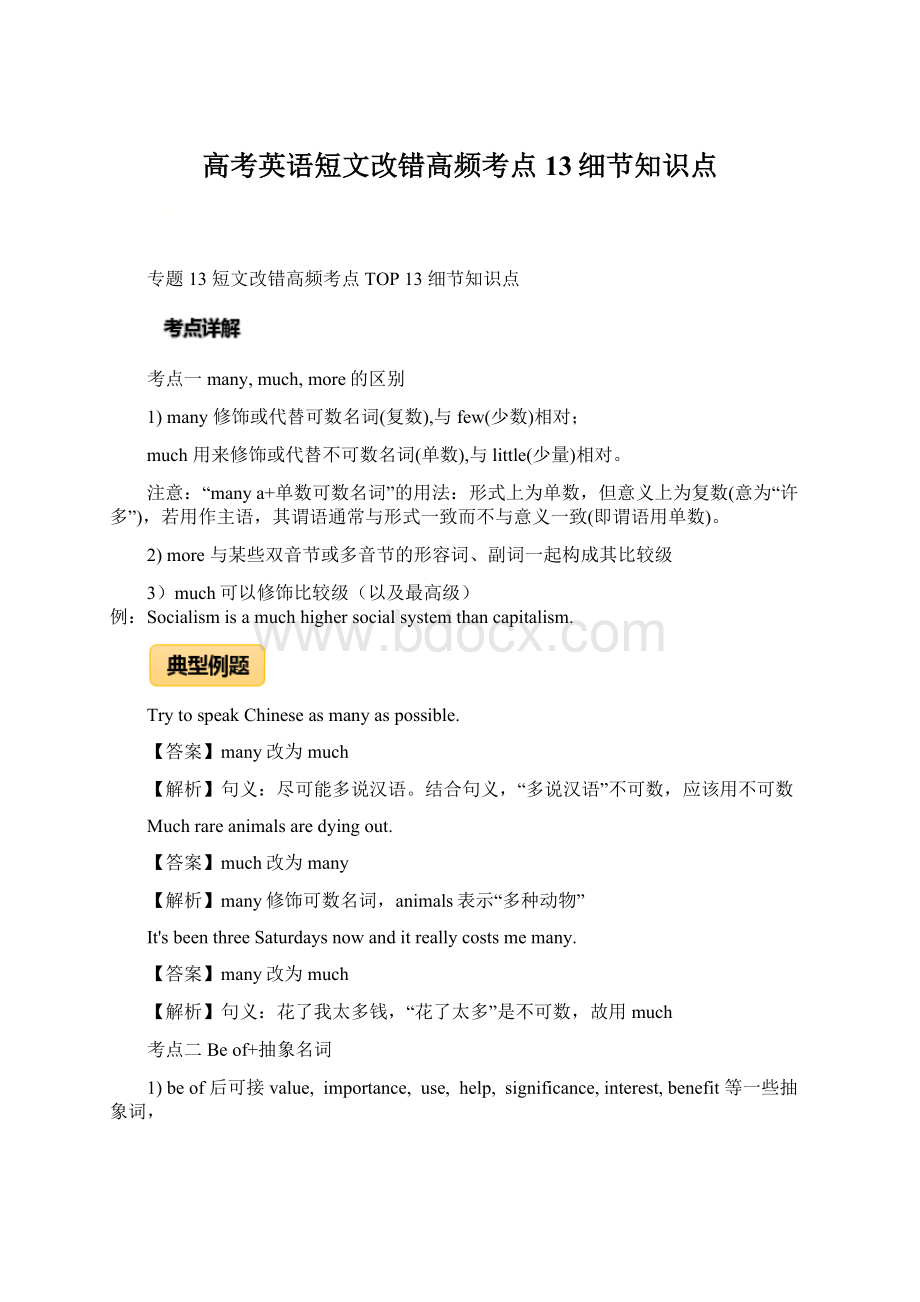高考英语短文改错高频考点13细节知识点.docx
《高考英语短文改错高频考点13细节知识点.docx》由会员分享,可在线阅读,更多相关《高考英语短文改错高频考点13细节知识点.docx(22页珍藏版)》请在冰豆网上搜索。

高考英语短文改错高频考点13细节知识点
专题13短文改错高频考点TOP13细节知识点
考点一many,much,more的区别
1)many修饰或代替可数名词(复数),与few(少数)相对;
much 用来修饰或代替不可数名词(单数),与little(少量)相对。
注意:
“manya+单数可数名词”的用法:
形式上为单数,但意义上为复数(意为“许多”),若用作主语,其谓语通常与形式一致而不与意义一致(即谓语用单数)。
2)more与某些双音节或多音节的形容词、副词一起构成其比较级
3)much可以修饰比较级(以及最高级)
例:
Socialismisamuchhighersocialsystemthancapitalism.
TrytospeakChineseasmanyaspossible.
【答案】many改为much
【解析】句义:
尽可能多说汉语。
结合句义,“多说汉语”不可数,应该用不可数
Muchrareanimalsaredyingout.
【答案】much改为many
【解析】many修饰可数名词,animals表示“多种动物”
It'sbeenthreeSaturdaysnowanditreallycostsmemany.
【答案】many改为much
【解析】句义:
花了我太多钱,“花了太多”是不可数,故用much
考点二Beof+抽象名词
1)beof后可接value, importance, use, help, significance,interest,benefit等一些抽象词,
这样的结构用来说明句子主语所具有的作用、重要性或意义。
在这类抽象名词前我们可用一些形词,如:
great,little,some,any,no,notmuch等来修饰抽象名词,用以说明程度。
如:
TheyareofgreathelptolearnersofEnglish.
他们对英语学习者有很大帮助。
2)beof+名词,还可用来说明句子主语在度量,大小,颜色,类别等方面的特征。
这类名词有colour,age,size,height,weight,shape,type,kind,quality等。
在这类名词前常用different, all,thesame,this,that, a(n)+形容词等词来修饰或说明。
如:
Coinsmaybeofdifferentsizes,weights,shapes,andofdifferentmetals.
货币可能在大小、重量、形状和铸造的金属方面都有所不同。
Thesepensareofmanydifferentcolours.
这些笔有许多不同的颜色。
Thebookwillbeofgreatvaluabletostudentsofhistory.
【答案】valuable改为value
【解析】of+抽象名词的结构,故改为value
考点三toone’s+情感类名词
“to+one’s+情感名词”是英语中一个十分有用的结构,主要表示某人由于某事的发生而唤起其内心的某种情感,通常译为“令某人……的是”“使某人感到……的是”。能用于该结构的名词非常有限,常见的有admiration(羡慕),amazement(惊奇),amusement(娱乐),annoyance(烦恼),astonishment(惊奇),delight(欣喜),despair(绝望),disappointment(失望),embarrassment(难堪),happiness(幸福),horror(恐怖),joy(高兴),puzzlement(疑惑),regret(遗憾),relief(放心),satisfaction(满意),shame(羞愧),sorrow(悲伤),surprise(惊讶)等。
如:
Tomyamazement,hearrivedontime.令我惊异的是,他居然准时赶到了。
Tomygreatamusementhisfalsebeardfelloff.使我感到极其好笑的是,他的假胡子掉了下来。
若要加强该结构的语气,通常有两种方式:
1)在名词前加great,deep,utter等形容词修饰。如:
Toourgreatdelightthedayturnedoutfine.使我们感到十分高兴的是,天气转晴了。
TomygreatdisappointmentIfailedtogetthejob.我没得到那份工作,大为失望。
2)在整个短语前加副词greatly,much等修饰。如:
Greatlytomyregret,Icannotattendtheparty.很可惜的是,我无法参加聚会。
Hehassucceeded,muchtothedelightofhisparents.他成功了,这使他父母都非常高兴。
Toourgreatdelightedthedayturnedoutfine.
【答案】delighted改为delight
【解析】to+one's+表示情绪的名词,故改为delight
考点四Late,later,latest,lately
lateadj.形容词 ,1) “迟的,晚的” I was late for school. 我上学迟到了。
2)晚期的, 末期的 He began the work in late May. 他在五月底开始这项工作。
3)不久前的,最近的 the late government 上届政府
4) 新的;刚刚到的 some late news 一些新消息
adv.副词,1) 迟,晚 I got up late. 我起晚了。
2) 晚期,末期 The bush was planted late in the season. 灌木是在季末才种上的。
later 1)副词,“以后、后来”可单独使用,用于过去时或将来时;
Later the boy found his mother.后来那个男孩找到了他的妈妈。
2)副词,“…之后、过了…”,可放在时间段后,只用于过去时;
He arrived in London on Monday, two days later he left for New York.他星期一到了伦敦,两天后他出发去纽约。
3)形容词,为late的比较级或意为“后期的,晚期的”
the later comers来的较晚的人
latest 1)副词,late的最高级“最晚,最迟”
come the earliest and leave the latest来得最早,走得最晚
2)形容词“最迟的、最晚的”the latest comer来的最迟的人
“最近的、最新的”the latest Pairs fashion最新的巴黎时装款式
3)名词,“最新消息、时装等”
Have you heard the latest about the war?
你听到有关战争的最新消息了吗?
Lately副词,与recently同义。
“最近、近来”What have you been doing lately?
你最近在做什么?
He came as lately as last week.他最近在上周来过。
Lateon,myauntdrovemyhome.
【答案】Late改为Later
【解析】Late迟的,晚的;Later之后
考点五much,even,than
1)Even修饰形容词、副词的比较级,加强比较的语气和程度,表示前者比后者强很多,通常采用much,still等
Heworksstillharderthanever.=Heworksharderstillthanever.他比以往更加努力学习了。
2)表示前者在某方面远远地超过对方时,通常采用far,byfar,alot,agreatdeal等。
Mattersarealotbetterthaneverbefore.情况远远比以往好。
3)在否定句、疑问句或条件状语从句中,修饰形容词、副词的比较级,只能用any来修饰。
Hecan’tjumpanyhigher.他不能跳得更高了。
Canhejumpanyhigher?
他能跳得更高一些吗?
IwillbuyacartodrivethemtowherevertheywantwhenIgrowupbecausethecarisfasterandveryconvenientthanthebike,especiallywhenitrains.
【答案】very改为more
【解析】and表示并列,前面faster比较级,故and之后也是比较级
考点六The+比较级,the+比较级
“The+比较级…,the+比较级…”.该结构意为“越…,越…”
Themoredifficultthequestionsare,thelesslikelyheisabletoanswerthem.问题越难,他回答出来的可能性就越小.
Theharderyoustudy,thehighyourscoreswillbe.
【答案】high改为higher
【解析】“The+比较级…,the+比较级…”的结构,故改为higher
考点七比较级+比较级
Lifeisbecomingbetter and better.
考点八介词to+doing
belongto属于
addto增加
beusedto习惯于
beaddictedto沉溺于
beaccustomedto习惯于
stickto坚持
bedevotedto贡献
adaptto适应
objectto反对
referto谈到
getdownto开始做
leadto导致
contributeto有助于
turnto求助;转向
Whenitcomesto...当提及到……
SoIamusedtotalkinfrontofotherpeople.
【答案】talk改为talking
【解析】beusedtodoing习惯于做某事,故改为talking
考点九介词+doing
1.单个的介词,如:
in,on,with,by,for,at,about,under,of等;
2.复合介词,例如:
into,within,throughout,inside,outside,without等;
3.短语介词,如:
outof,becauseof,awayfrom,ontopof,eversince,nextto,accordingto,infrontof等。
一般情况下,介词后的动词都应该用doing的形式(but,except除外)
1)Forfearofgetuplatethenextmorning,Iputthreealarmclocksnearmybedandsetthealarmrespectivelyat6:
00,6:
10and6:
15.
【答案】get改为getting
【解析】of介词,后加doing形式
2)Thanksforlisten.
【答案】listen改为listening
【解析】for介词,后加doing形式
考点十强调句
1) 陈述句的强调句型
Itis/was+被强调部分(通常是主语、宾语或状语)+that/who(当强调主语且主语指人)+其他部分。
例子ItwasyesterdaythathemetLiPing.
2)not…until… 句型的强调句
A.句型为:
Itis/wasnotuntil+被强调部分+that+其他部分
普通句:
Hedidn'tgotobeduntil/tillhiswifecameback.
强调句:
Itwasnotuntilhiswifecamebackthathewenttobed.
3)谓语动词的强调
A.Itis/was...that...结构不能强调谓语,如果需要强调谓语时,用助动词do/does或did
Dositdown.务必请坐。
Dobecarefulwhenyoucrossthestreet.过马路时,务必(千万)要小心啊!
B.注意:
此种强调只用do/does和did,没有别的形式;过去时用did,后面的谓语动词用原形。
考点十一too,aswellas,either,aswell
aswell用法:
1、aswell常用作状语,作“又;也”解,相当于too或also,常位于句末,无须用逗号与句子分开.如:
IamgoingtoLondonandmysisterisgoingaswell(=going,too).
aswellas后接动名词短语,意为“不但…而且…”,若后接从句,则是和....一样,,请看下列例句:
①Shesingsaswellassheplays.她弹得好,唱得也好.
②HespeaksFrenchaswellas(hespeaks)English.他英语和法语讲得一样好.
2.aswellas连接两个谓语动词时,它们的时态应保持一致.
例如:
Hepublishesaswellasprintshisownbooks.他的书是他自己印刷出版的.
Wearerepairingtheroofaswellaspaintingthewalls.我们在粉刷墙壁同时也在修理屋顶.
also,either与too三者都是“也”的意思,also,too用于肯定句,其中also用于句中,too用于句尾,且前面有逗号;either用于否定句,且前面有逗号。
例如:
Hisfatherisadoctor;hismotherisalsoadoctor.
Hisfatherisadoctor;hismotherisadoctor,too.
Hisfatherisn'tadoctor;hismotherisn'tadoctor,either.
考点十二星期,every,this,that,next,last+day,week,month,year等词前不加介词或冠词
1)当时间状语是today,yesterday,tomorrow,tonight,yesterday/tomorrowmorning(afternoon,evening)等时,其前不用介词。
例如:
Therewasafootballmatchyesterdayevening.昨天晚上有一场足球赛。
2)由this,that,these,those等构成的短语前不用介词。
例如:
I'llvisitmygrandparentsthisweek.这一周我要去看望我的祖父母。
。
3)由形容词last,next等指示代词修饰的名词词组用作时间状语时,前面的介词at,on,in一般省略。
例如:
Isawhiminthestreetsometimelastweek.上周我在街上见过他。
但是,如果不是介词at,on,in,而是其他类型的介词,一般不能省略。
如:
Ihaven'tbeentomyhometownsincelastyear.从去年以来我就没回过家乡。
4)在以“theday(week,month,year)+before/after…”构成的时间状语前不用介词。
例如:
Wheredidyougothedaybeforeyesterday?
前天你去哪里了?
5)由every,each等表示频率的副词构成的短语用做时间状语时,其前不用介词。
例如:
DoyouwatchTVeveryday?
你们每天看电视吗?
考点十三therefore,besides,however,otherwise,moreover
这些副词/连词可以连接两个从句或两个句子。
此时它们被认为是“准连词”。
除了therefore二者为连词外,它们也可有其他用法,有时用做其他词类。
它们在句中的位置取决于它们的用法。
1)besides(介词)意为“除……外又……”。
它位于名词/代词/动名词之前:
BesidesdoingthecookingIlookafterthegarden.
除了做饭之外我还得管园子。
besides(副词)意为“又,另外”,通常位于它引导的从句之前,有时也可位于其后:
Ican’tgonow;I’mtoobusy.Besides,mypassportisoutofdate.
我现在不能走,我太忙了。
何况我的护照过期了。
在较正式的英语中,可以用moreover代替besides。
在较非正式的英语中,也可用anyway或inanycase代替这样使用的besides:
Anyway,mypassport’soutofdate.
反正,我的护照过期了。
2)however可位于形容词/副词之前:
Youcouldn’tearnmuch,howeverhardyouworked
无论你干得多卖力,你都挣不了多少钱。
however(连词)通常意为“但是”,可位于它所引导的从句之前或之后,或位于第一个词或短语之后:
I’llofferittoTom.However,hemaynotwantit./Hemaynotwantithowever./Tom,however,maynotwantit./If,however,hedoesn’twantit...
我将提出把这个给汤姆,然而他可能不要它。
/而汤姆可能不要它。
/然而,万一汤姆不要它的话……
但提到两句意义相反的话时,however意为“但是/仍然/同样”:
Theyhadn’ttrainedhard,but/however/nevertheless/allthesametheywonhowever/nevertheless/allthesame.
他们并没有刻苦训练,但/无论如何/仍然/同样获胜了。
3)otherwise(副词)常常位于动词之后:
Itmustbeusedinawell-ventilatedroom.Usedotherwiseitcouldbeharmful.
必须在通风条件好的房间里使用。
如不这样使用则可能是有害的。
otherwise(连词)意为“要是不/否则”:
Wemustbeearly;otherwisewewon’tgetaseat.
我们得早点去,否则我们就没有座位了。
在英语口语中,这里也可用or:
Wemustbeearlyor(else)wewon’tgetaseat.
(译文同上。
)
4)therefore(连词)在正式英语中可用来代替so。
它可位于一个从句之前、该从句的第一个词或第一个短语之后、或该从句的主要动词之前:
ThereisfogatHeathrow;theplane,therefore,hasbeendiverted/theplanehasthereforebeendiverted/thereforetheplanehasbeendiverted.
希思罗机场有雾;因此飞机转飞别的机场了。
1)EncouragingbyourEnglishteacher,wetalkedaboutourunderstandingofdreams.Opinionsonthismatterdifferfrompersontoperson.Otherwise,weallbelievedthatourdreamswouldcometrueoneday.
【答案】otherwise改为however
【解析】根据句义,应改为however
2)Theseaisvastandsometimesyoucanfindaboatoraship.Youmayalsodosomefishingasfarasitispermitted.Moreover,Ithinkthedrivertheredrivetoofastinthestreet.
【答案】moreover改为however
【解析】根据句义,前后表示转折
3)BeforeIleft,Idocheckitcarefullyandeverythingwasallright.WhenIgothome,therefore,Ifoundafaultwithit.
【答案】therefore改为however
【解析】根据句义,前后表示转折
考点十四Insteadof,instead的误用
1)词性不同。
instead of是短语介词,意思是“代替”、“而不是”。
instead是副词,意思是“代替”、“顶替”。
例如:
Shall we have fish instead of meat today?
我们今天吃鱼不吃肉,好吗?
Give me the red box instead of the yellow one.
把那个红色的盒子给我,不是这个黄色的。
2)使用方式不同,instead一般用在句末,如位于句首时常用逗号与后面阁开。
与instead of不同,instead of后面一般接名词、代词、动名词或介词短语作它的宾语。
instead在顺接句子中作“代替”讲,而在转折(或逆转)句子中作“然而”讲。
例如:
Last summer I went to Qingdao. This summer I’m going to Dalian instead.
去年夏天我去了青岛。
今年夏天我将去大连。
Lilyisn'there.AskLucyinstead.Lily
不在这儿,去问Lucy吧。
注意:
当inste